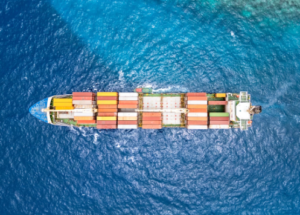How Artificial Intelligence Can Transform Sea Freight

Photo by Bent Van Aeken onUnsplash
Artificial intelligence (AI) has already transformed a range of industries by assisting with learning and problem-solving. Now, it’s becoming an invaluable addition to international shipping to help companies save time and money, and help consumers receive their goods promptly. As challenging as it can be to adopt new tech in any industry, shipping companies are finding favor with AI by using it in the following ways:
Route Optimization
In the past, route planning was a largely manual task with time-consuming elements. Shipping company employees could easily spend hours poring over data to devise the best routes, with no guarantees that they would get it right. Now, anyone with an AI related degree can use AI tools to plot the most efficient and optimized routes for seamless supply chains.
Using machine learning, AI systems access data about vessel performance, traffic, routes, and weather from various sources like GPS, traffic sensors, and weather forecasts before planning out a route that factors them all in. It can also optimize the route as travel gets underway.
A number of major shipping companies have already implemented AI route optimization, including Maersk and CMA CGM Group.
Efficient Cargo Loading
When loading cargo ships, experts working for ports and shipping companies must ensure all cargo can be loaded aboard quickly and with minimal risk of damage. While there are plenty of experts in this field, AI is proving helpful in optimizing the process.
Using machine learning and automation, AI systems like StowAI by Loadmaster.ai collect real-time data from cargo, vessels, and ports to examine factors like cargo weight and volume, stability, and ship capacity. The data is fed into AI algorithms and analyzed to plan the best loading and unloading methods.
There can be many benefits associated with more efficient cargo loading, like safety, a reduced risk of cargo damage, the need for fewer transport vehicles, and even less fuel consumption. These benefits have meant that many leading shipping lines have already adopted AI cargo loading, like CMA CGM.
Autonomous Ships
It’s hard to picture a ship without a captain at the helm, but that could very well be the future. The International Maritime Organization is already implementing guidelines for how autonomous ships will operate in our waters.
Autonomous ships rely on navigation systems to plot their courses and satellite communication systems to connect with ships, ports, and control centers. Autonomous ships also have control systems that manage engines, rudders, thrusters, and other components.
While still not commonplace, autonomous ships are in development as we speak. The first fully autonomous ferry was launched by Rolls-Royce and ferry operator Finferries in Turku, Finland, in 2018. In 2021, Kongsberg, in collaboration with Yara International, introduced the first electric and self-driving containership.
There is hope that AI ships will reduce human error, increase safety, lower fuel consumption, and significantly reduce operational costs.
Predictive Maintenance
There are few things as frustrating for shipping companies as having a route and timeframe planned for a cargo ship, only for a significant failure to undo it all. While mechanical and electrical problems can happen at any time, AI can assist with predictive maintenance to prevent some of them.
Using numerous ship sensors, historical maintenance data, and AI algorithms like machine learning and deep learning to analyze the data, ship companies like Maersk can monitor their ships in real-time and predict the need for maintenance before failures occur. There’s potential for AI to minimize downtime, extend the life of vessels, and improve ship reliability.
Improved Sustainability
Many shipping companies have significantly improved their sustainability in recent years, especially regarding reducing their carbon emissions. Artificial intelligence is helping to make the whole process of greener shipping much easier.
By analyzing data from sources like vessel sensors, weather patterns, and port operations, AI can help companies monitor their carbon emissions, identify opportunities to improve them, and comply with international regulations. Maersk, CMA CGM, Eastern Pacific Shipping, and Commonwealth Shipping Line are just some of the many companies to explore AI for efficiency and sustainability.
The shipping industry is one of many to be on the brink of transformation courtesy of artificial intelligence. From money and time savings to reduced emissions and better safety, there is a significant amount of value to be gained from this innovative tech.
The post How Artificial Intelligence Can Transform Sea Freight appeared first on Container News.
Content Original Link:
" target="_blank">




































































